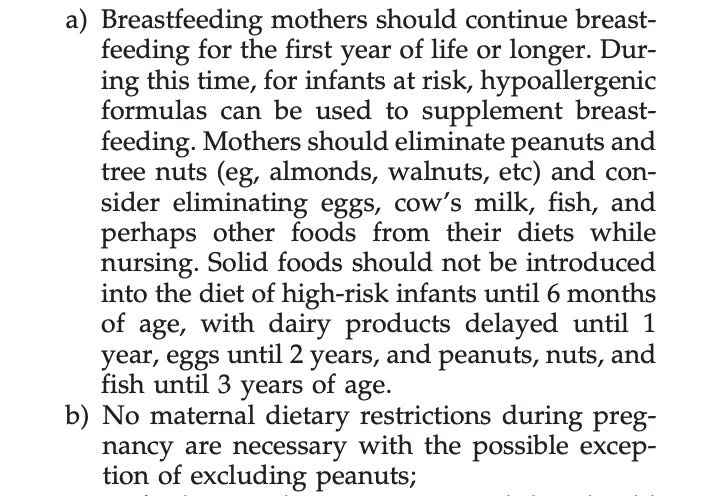The American Academy of Pediatrics (AAP) is a failed organization. For years, they have made mistakes, but the pandemic elevated their failings to catastrophic errors.
Pre-pandemic, the AAPs failures were due to overconfidence; making recommendations when the right action would be to express uncertainty and support efforts to collect better data. During the pandemic, this deficiency was paired with naked politics, and selling out scientific thinking to political allegiance. Ultimately, children were abandoned by the millions by the AAP.
My proposed solutions include dismantling the AAP and creating a new organization: resistant to political pressure, with the sole goal of promoting the well-being of children.
First, I will consider just one example of the AAPs pre-pandemic error, and then I will detail the AAPs repeated failures to support children during the pandemic.
The AAP gives the wrong advice on peanuts
In 2000, the AAP, based solely on opinion, issued guidance that mothers of children at high risk for food allergy avoid (a) eating nuts when pregnant, (b) eating nuts when breast feeding, and (c) delay peanut exposure for kids until they are 3 years old. (Pediatrics 2000)

In the years that followed the AAP’s “expert” advice, rates of peanut allergy doubled in the population.
Ultimately, in 2015 ,a randomized trial was reported. The trial randomized high risk infants to early exposure to peanuts (4 -11 months) vs. delaying this exposure (per the AAP’s advice). The trial found that early exposure was far better for kids, “Among infants with high-risk atopic disease, sustained peanut consumption beginning in the first 11 months of life, as compared with peanut avoidance, resulted in a significantly smaller proportion of children with peanut allergy at the age of 60 months.”
In short, the AAP got it wrong.
Did they AAP need to issue their 2000 guidance at all? Some contend that the AAPhadto say something. But this is false. They could have simply admitted: we don’t have data. They might have suggested a randomized studies with at least 3 randomizations (factorial design). Randomize woman to their advice (don’t eat peanuts or not) during pregnancy, during breastfeeding, and for introducing solid foods.
Had the AAP admitted uncertainty and suggested a trial in 2000, two things might have happened. Fewer peanut allergies over the next decade (as there would be less off-protocol use), and the trial might have launched and resulted sooner.
What’s the take home lesson?The lesson for the AAP, and one all doctors should heed: when you don’t have robust data, you should have humility. It’s ok to have hypotheses, but be honest about what you don’t know. You should always admit there is uncertainty, and you should point out studies that would help reduce it. Guidelines are great, but they are best issued AFTER you run the right study, not BEFORE it.
The AAP could have learned their lesson: be wise, be humble, but they did no such thing. As the AAP dealt with the pandemic, they would become a deranged organization, both incompetent and nakedly political.
The AAP sacrifices kids to prevent Trump from a Political win
Between June and July 2020, according to National Public Radio reporting, the AAP “Walk[ed] Back Support For In-Person School.”
The facts are simple. The AAP initially put forth the right decision, “recommending that education leaders and policymakers “should start with a goal of having students physically present in school” by fall of 2020.
Then Trump famously voiced his full-throated support for reopening schools 100% by the fall, and cited the AAP report as evidence he was correct. (For the record: Trump was correct about this one issue).
The AAP immediately began walking back support for children. The AAP president said, “local coronavirus infection rates and hot spots have to be taken into consideration to safely reopen schools.” But, this was inaccurate. European experience showed that reopening was possible irrespective of local infection rates; Kids could benefit from school, even in places with high spread, and schools could safely reopen even there.
In an NPR interview the AAP president, specifically criticized Florida, whose governor was Republican that its plan to aggressively reopen schools was against their recommendation.
Ultimately, the AAP issued a second statement that further eroded support for schools. This statement wascosigned by, “the two national teacher unions and AASA, the School Superintendents Association.” The statement said, “Public health agencies must make recommendations based on evidence, not politics.”
The irony was palpable. The AAP cautioned that science not politics should guide children’s schools decisions, while they themselves were engaging in politics and not science to sabotage schooling. Their flip flop occurred in response to actions taken by the Trump White House, and specifically singled out Republican Governor DeSantis.
Ultimately, these were not insignificant actions, they kept schools closed in Democratic cities for another year; and the harmful impact on millions of children has yet to be fully realized. I believe it will exceed even the most catastrophic predictions.
The AAP on masking kids
In contrast to the World Health Organization (WHO), UNICEF, and the European CDC, the US’s AAP decided that kids…
Read the full story here: Source: The AAP (American Academy of Pediatrics) is broken, failed organization
